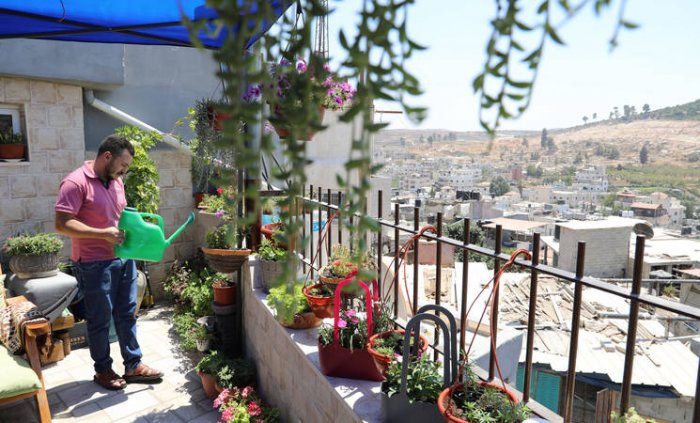Ihab Abu Khairan lives in the heart of Arroub refugee camp in the occupied West Bank. Overcrowded and often subject to tear gas and incursions by Israeli Security Forces (ISF), Ihab’s love of agriculture and nature distracts him from the harsh reality of the circumstances of his community. This passion inspired him to start a roof makeover project. He hopes to spread the tranquilty his rooftop garden gives him to his neighbours too.
It all started in 2018, when Ihab, then 24 years-old started his roof makeover project. He submitted his green roof project idea to the Hult Prize competition at Hebron University. It won him first place at university level and went on to win first prize at regional level that following year. This competition is open to university students from all over the world and encourages them to develop projects that will solve the problems facing their communities.
“The competition called for a productive or pioneering project that could serve more than 10,000 people. Since I was studying agronomy at the time – something I still have great passion for – I came up with this idea, inspired by similar successful projects in different parts of the world. I won first prize at the Hebron University level, then I was also awarded the same prize at the southern governorates regional level.”
Ihab’s project enables for the vertical urban expansion of green space. This is essential given that refugee camp boundaries are fixed and public spaces are hard to justify when primary housing is scarce.
With the onset of the COVID-19 pandemic last year, Ihab was forced to spend most of his time at home. This prompted him to start implementing his rooftop garden project. “During the first weeks of quarantine, I found that I had a lot of time on my hands. I started to implement my garden project and as you can see, it’s colorful and comfortable despite its small size. It’s a place where we can sit and relax every day. When things got better with COVID-19 we invited friends and relatives over,” Ihab added.
“Did you know that you can plant an entire acre of land in an area of less than 500 square meters on the roof of your house? What’s more is that it’s very cost efficient. It costs less than US$ 600 to plant a 4×4 meter garden,” Ihab highlighted.
Despite the brilliant idea, the residents of Arroub camp are hesitant to put gardens on the roofs of their homes. Even with their need for green space, they usually use the space to build additional rooms to accommodate their growing families.
The unstable security situation is another consideration. “The security situation in the camp is very unstable. Gas bombs are launched at our homes almost daily and my plants have been destroyed more than once by Israeli tear gas canisters,” recalls Ihab.
Ihab currently manufactures organic fertilizers for sale at home and is currently studying veterinary skills in hopes of being veterinary professional one day. He also provides health care for livestock, sheep, and other farm animals. “I studied in UNRWA schools until the ninth grade. I was born, raised and have lived here all my life, which means I fully belong to this camp. I volunteered with the UNRWA Health Committee in the First Aid Division. During the past year, I helped UNRWA staff to identify vulnerable humanitarian cases for aid support and distribution,” said Ihab.
In addition to volunteering with UNRWA, Ihab volunteered in a project to build greenhouses to produce agricultural crops for a number of refugee families in the camp. He is always quick to provide any assistance or advice to his neighbours and friends, on agricultural or veterinary matters. He adds, “We live in a semi-besieged area and the families here have limited financial resources. So I feel it’s my duty to provide help and assistance in any form to make life easier for the residents of Arroub camp,” he said.
Ihab hopes that UNRWA will adopt his green roofing project and mainstream it in other camps across the West Bank. “I want the roofs of refugee homes to look colorful and green instead of dull gray, which will hopefully bring joy and happiness to the refugee families,” Ihab noted.
Ihab’s passion for greening roofs is part and parcel of the 2021 International Youth Day theme “Transforming Food Systems: Youth Innovation for Human and Planetary Health”. His innovative greening idea can be applied to urban farming and furthers the health of the planet. UNRWA is proud to serve Palestine refugee youth like Ihab in the West Bank and across the Agency’s five fields of operation.



